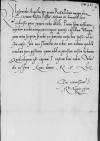List #3112
Sigismund II Augustus Jagiellon do Ioannes DANTISCUSVilnius, 1547-06-09
| odebrano Heilsberg (Lidzbark), 1547-06-16 Rękopiśmienne podstawy źródłowe:
Publikacje:
| ||||||||
Tekst + aparat krytyczny + komentarz Zwykły tekst Tekst + komentarz Tekst + aparat krytyczny
Reverendissimo in Christo Patri, domino
Reverendissime in Christo Pater, sincere nobis dilecte.
Praeter spem nostram equidem accidit interpretatio negotii generosi
Quod reliquum est, cupimus Paternitatem Vestram bene valere.
Ex commissione s(acrae) or s(erenissimae)⌈s(acrae)s(acrae) or s(erenissimae)⌉a maiestatis regiae propria.


 BCz, 1618, p. 52
BCz, 1618, p. 52